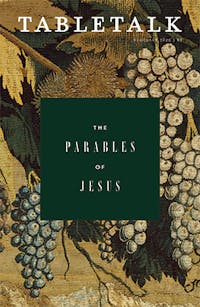
Request your free, three-month trial to Tabletalk magazine. You’ll receive the print issue monthly and gain immediate digital access to decades of archives. This trial is risk-free. No credit card required.
Try Tabletalk NowAlready receive Tabletalk magazine every month?
Verify your email address to gain unlimited access.
These two parables are arguably Jesus’ simplest and certainly among His shortest, and yet the punch they pack far exceeds their word count. Why have they proven so memorable? Because they tap into our God-given imagination. You don’t need an advanced degree in theology to understand what’s going on here. On the contrary, if you have ever searched for Narnia in your backyard, or dusted off a forsaken corner of your attic in hopes of discovering a long-lost antique, or simply thought to yourself, “Is there a better way we could do this?” then you are well equipped to hear what Jesus has to say. Jesus wants our minds to wonder, “What would I do if I found the impossible?” Then He reminds us that we have found it: the kingdom of heaven.
These parables are so engaging because all of us have experienced “the search.” Maybe it was a lost heirloom, or a way to pay for college, or that elusive perfect cup of coffee, but you know what it is to search. The universal human experience of search and discovery provides the setting and metaphorical starting point for these two parables. Now imagine that your search ended in a glorious and life-altering discovery, for happily these parables do not project a world in which one’s quest might prove fruitless. Quite the contrary—the discovery is unexpectedly glorious. That’s what Jesus is calling us to imagine and consider here: What would you do if your search ended in a truly momentous find?
That question brings us to the main point of these parables. Though the metaphorical setting is the search and the surprising discovery, the main emphasis actually lies in the cost. Consider the parable of the treasure. The possibility of finding a treasure buried in a field was rare but not entirely far-fetched in the ancient world. Given the lack of safe deposit boxes and alarm systems, the most secure place for one’s treasured possession might indeed be “under the mattress.” Jesus, however, is not overly interested in the details. His concern and emphasis are on the price our treasure finder is willing to pay. And Jesus’ point here is as striking as it is straightforward. It costs the man everything to obtain the treasure, and he doesn’t even stop to do the math. He acts on impulse, moved and motivated by the energy of his “joy” (Matt. 13:44). The beauty and glory of the kingdom are such that the one who finds it and knows what he has found reacts out of instinctive joy, sacrificing it all and counting it no loss in order to obtain the impossible.

The parable of the pearl of great price looks even more surprising and more challenging in this regard. On the surface, it might appear that not much is happening in the second parable that isn’t already more clearly stated in the first. In both, the searcher sells all he has to gain the prize—but there seems to be a bit of a twist in the pearl parable. There is an irrationality in the merchant’s action that begs consideration. The merchant doesn’t sell everything in order to obtain something of greater value, as in the previous parable. On the contrary, the merchant sells everything—including (presumably) his existing pearl inventory—to buy one single pearl. That’s simply not good business. His actions demonstrate that he’s not in the pearl business for the money; he’s in it for the pearls, and now he has found The Pearl. He’s not really a merchant but a pearl collector, and to own this pearl is to own the only pearl that matters. Why did the merchant sell everything to become the (homeless?) owner of a single pearl? For the love of this pearl. For, again, the joy of it. That’s the twist of the second parable; ironically, the merchant is apparently less financially motivated than the field worker, for the merchant sacrifices everything not for the hope of greater income but for the simple joy of possessing the pearl.
These parables thus call us to consider our love for the kingdom. With the treasure, Jesus asks us to reimagine what we value. Are we accounting rightly when it comes to the things of this world and the next? Would we sacrifice all worldly good to obtain something infinitely better? Then, with the pearl, He asks an even harder question: Is that sacrifice truly for the pure love of the kingdom? The treasure probes our vision and values: Do we see that the kingdom is more? But the pearl probes deeper still into our heart and will: Do we see that the kingdom is all?
